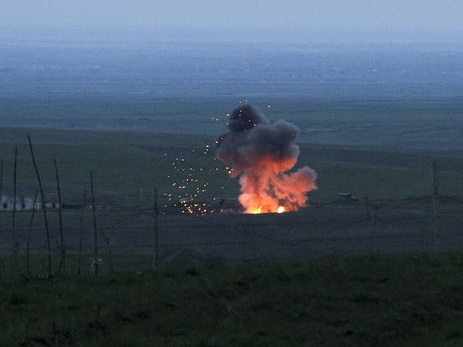WSJ: Fighting Dies Down Between Azerbaijan and Armenian Rebels

A tentative cease-fire appeared to take hold Tuesday in the breakaway region of Nagorno-Karabakh, as ethnic Armenian separatists largely stopped exchanging fire with Azeri government forces following the area’s worst violence in decades.
“There is zero fire from both sides” said Artak Beglaryan, the spokesman for the separatist republic’s prime minister, despite the absence of a formal truce. “At this moment, there is no written agreement.”
The Armenian Defense Ministry told Interfax that some shots were still occasionally heard. The Azeri Defense Ministry confirmed Tuesday’s cessation of hostilities, Interfax reported.
Along the front lines near Hadrut, a town in the southern part of Nagorno-Karabakh, Armenian separatist troops manning an artillery battery said their sector had been quiet since midafternoon Tuesday.
“It was pretty active” until the cessation of hostilities, one soldier said.
Hostilities escalated Friday when Azeri troops broke through Armenian separatist lines in a bid to retake strategic heights within Nagorno-Karabakh, a mountainous enclave held by ethnic Armenians within the territory of Azerbaijan. Intense exchanges of fire continued until Tuesday.
The fighting has claimed dozens of lives, though the death toll on either side couldn’t be independently verified.
Azerbaijan has long threatened to retake the region that it lost control of following six years of fighting with Armenia, fighting that began in the final years of the Soviet Union. A cease-fire brokered by Russia in 1994 froze the conflict along a boundary, known as the line of contact, between the two sides. They never signed a peace agreement.
Residents of the separatist enclave buried their dead Tuesday, as international powers urged an end to the hostilities.
In the courtyard of a concrete Soviet housing block in Stepanakert, the capital of the self-declared republic, a crowd of around 200 gathered to mourn Masis Tovmasian, a local militia volunteer who was killed over the weekend.
Friends and neighbors laid bouquets outside the stairwell, as a pair of priests recited liturgy inside the family’s apartment. Men carried the coffin down to the courtyard and laid it on a table covered with a carpet, while a military band played a funeral dirge.
“It’s such pain, it’s such pain,” said Eva, the widow of the slain man. “I don’t know how anyone could comprehend the pain our two children will have to endure all their lives.”
Casualties continued to trickle in to the main military hospital in Stepanakert before the two sides stopped trading fire. A young separatist artillery captain said his unit was in the rear when they were hit by mortar rounds; his left leg was shattered by the blast and shrapnel.
Earlier in the day, Azeri President Ilham Aliyevsaid the government in Baku was ready to agree to a mutual cease-fire, Interfax reported.
“We want a continuation of talks,” Mr. Aliyev said during a meeting with soldiers and their relatives in the Azeri capital.
Armenian President Serzh Sargsyan said he would conduct an official visit to Germany, which currently holds the chairmanship for the Organization for Security and Cooperation in Europe, a group charged with helping foster peace in the region.
Russian President Vladimir Putin held telephone conversations with the presidents of Azerbaijan and Armenia, which supports the rebel enclave, the Kremlin said.
“Vladimir Putin called both sides to immediately guarantee a complete cessation of military activities and observe the truce,” the Kremlin statement said.
Washington and Moscow had called on both sides to exercise restraint in the conflict, which also prompted Turkey, Azerbaijan’s regional ally, to express its solidarity with Baku.
Turkish Prime Minister Ahmet Davutoglu said Tuesday that Armenian attacks had triggered the latest round of fighting in Nagorno-Karabakh, condemning the assaults during a speech to his governing party’s lawmakers in Parliament.
“The whole world should know that Turkey will stand shoulder-to-shoulder until the end of the world with dear Azerbaijan against Armenia’s aggression and occupation,” Mr. Davutoglu said in Ankara.
Armenia, though it hasn’t recognized the independence of Nagorno-Karabakh, is the region’s main backer financially and militarily. Authorities in Nagorno-Karabakh acknowledge that volunteers from Armenia fight in the ranks of local forces but say the separatist forces alone are fighting the Azeris.
In the village of Nizhny Oratag, not far from the northern Karabakh town of Martekert, Aleksei Grigoryan said Monday his family had sought refuge at an aunt’s house—although Mr. Grigoryan said he still visited his home near the front lines once a day to feed his chickens.
“Neither the Americans nor the Russians understand” the conflict, he complained.
Nathan Hodge














